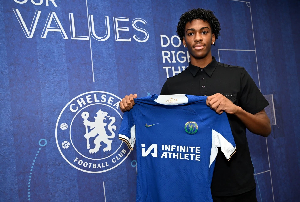- Home - News
- TWI News | TV
- Polls
- Year In Review
- News Archive
- Crime & Punishment
- Politics
- Regional
- Editorial
- Health
- Ghanaians Abroad
- Tabloid
- Africa
- Religion
- Election 2020
- Coronavirus
- News Videos | TV
- Photo Archives
- News Headlines
- Press Release
General News of Sunday, 25 March 2001
Source: The Black World Today
FEATURE: Shooting "Back to Africa" Bullets
By Cheo Taylor Tyehimba
Last week, on March 14th to be exact, I got shot.
I glanced at the cover of the Wall Street Journal and got shelled, hit hard with well-crafted propaganda. I know that's a heavy word and as soon as you use it, people immediately box you into a safe, neat corner. They are less threatened that way. But paper (or digital) bullets are no joke. And they don't take you out gangsta-style. They heat sink your brain and expand into unattributable hearsay, innuendo and subtle opinion-altering pieces of mind shrapnel.
The article, entitled: "For African-Americans in Ghana, The Grass Isn't Always Greener" and written by Journal Staff Reporter G. Pascal Zachary, is built on one notion: that African Americans living in Ghana, as well as those who visit, are not welcome by Ghanaians. "Far from seeing African-Americans as kin, most Ghanaians lump them together with other Americans, calling the whole lot obruni, which in the local Twi language means "white" or foreigner," reports Zachary. "With better education and deeper pockets, African-Americans strike many Ghanaians as arrogant. "When they get into any situation they want to take over, and we are not like that," says R. William Hrisir-Quaye, an official with Ghana's commission on culture."
As a journalist and university lecturer who has visited and written extensively about Ghana, I am very familiar with Ghana's complexities, both positive and negative. I also know unfair, inaccurate journalism when I see it. I personally know several of the people Zachary interviewed in his piece and like most journalists, know the formula for spinning stories. It mysteriously lies between the sly use of quotes, text and context, maligning by omission and, of course, corporate editorial & advertising mandates. The deadline driven, newsstand-rocking copy is then processed with assembly-line expediency. Just call it shake n' bake journalism. Ready to eat anytime.
Although there are truths in his story, it fails miserably to provide a balanced, objective view of the relationship between African Americans and Ghanaians or for that matter, shed any light on the many accomplishments of Ghana itself. Take for instance, the fact that the country recently held peaceful democratic elections and successfully handed over power to a democratically elected government after a nearly twenty-year regime. But is that newsworthy? Will that sell like controversy?
The article has already created an outcry among progressive black folk everywhere. Take for example Zachary's quoting of Audrey Gadzekpo, a Ghanaian newspaper columnist in Accra and women's rights advocate. After setting a hostile tone in the beginning of his piece through assorted one-sided vignettes and quotes, Zachary drops in a quote by Gadzekpo to fortify his ill intentions.
Here's the quote: "The African role in the slave trade is not an issue in Ghana. People here are totally detached from any guilt or responsibility for their ancestors selling other Africans into slavery. It's like there's some collective amnesia."
The thing is, Gadzekpo is making an objective analysis of the legacy of slavery and how Ghanaians have come to interpret or misinterpret it. Her quote, which was stated in the historical context of slavery itself, is innocuous, matter-of-fact. But when slyly inserted into a conversation about reconnecting to Africa, it is interpreted as injurious and uncaring. In fact, it is possible that the Zachary did not even interview Gadzekpo -- who received some of her schooling in the US and returned to Ghana -- for this piece but simply cut and paste this quote to suit his aims. If so, that's lazy, unethical journalism to say the least.
"I question the credibility of any reporter who quotes people out of context," says Richard Osei, a Ghanaian living in San Francisco. "It is extremely disturbing to read the "negative" spin one reporter can put on a country, or for that matter, the entire continent. As usual, the reporter specifically chose to write this "riveting" article at the expense fueling animosity among Africans and African Americans and despite the fact that Ghana continues to make a historic democratic turn. Even the tone of the article potentially could fuel a downtown in Ghana tourism," says Osei, an entrepreneur with his business sights on Africa.
The WSJ piece also reports that Ghanaians see African Americans not as brothers and sisters but only as "dollar signs." To highlight this view is one thing but to ignore the fact that all Americans, regardless of race, who visit marginalized nations are seen as "dollar signs" is to reveal an insidious agenda. Think about it. Who wins and who loses by this "divide and rule" strategy?
Some 35 years after Kwame Nkrumah, Ghana's first president, published his landmark book "Neo-Colonialism -- The Last Stage of Imperialism," his words still ring true: "...the financial preponderance of the United States is felt more and more through its influence over international capitalist journalism. Under this guise, a flood of the West, directed against China, Vietnam, Indonesia, Algeria, Ghana and all countries which hack out their own independent path to freedom."
The article also completely ignores issues of capitalism, imperialism and colonialism. But I'll flip it to you another way. This divisive line of thinking is tantamount to a camera zooming-in on two people bickering over a fender bender at a busy intersection. But if we pull the camera back for that all-telling longshot, we see the real deal: the damn traffic light is broke. Who else, but America, is directing the world's traffic?
They say the first basic rule of propaganda is to deliver deceptive information through a generally accepted, "reliable" source. But this one-sided, divisive, racist, anti-black, anti-Africa article ties a more efficient lynch knot than the Klan could have ever dreamed of. It's so transparent it ain't even funny.
"Unfortunately we still don't have a lot of sophistication in how we respond to the media," says Nehanda Imara, a college administrator. Imara, an African American, who lives in Oakland and is building a home in Ghana, says the mainstream media wields the same power as the police in black communities. "The white media ain't gonna give us nothing but a headache."
In the sixties, the FBI's Counter Intelligence Program (COINTELPRO) used misinformation and espionage to weaken black political resolve. Today, it seems most corporate newsrooms, largely still devoid of representative percentages of people of color and beholden to dollar deadlines, are creating more havoc in the black community than J. Edgar Hoover could've ever concocted himself.
The writer crafted the following lead for his article: "Kwaku Sintim-Misa, a popular comedian here, likes to tell a joke about the African-American who emigrates to Ghana. "Brother, I've found my roots!" the African-American crows. A local shakes his head, wondering why anyone with a coveted United States passport would choose to move to Ghana. "Move to the Motherland?" the Ghanaian cries, "I want to escape the Motherland."" And of course nowhere in the piece is there any mention of the sobering hows and whys out of which such a joke could be created in the first place. But hey, I love a good, politically incorrect joke anytime but come with something stronger. Make me wince. Perhaps this is all the writer could cull from the brother's act to suit his needs.
"These African Americans who have made this move should be applauded and encouraged not ridiculed," says Michel Bowman-Amuah, a Ghanaian in Denver. "Just because some educated Ghanaian's seek a different lifestyle in the USA does not in anyway indicate that living in Ghana is intolerable or that Ghanaians are any less satisfied or patriotic about their country. Let us celebrate the diversity of ideas and encourage this movement of people to Ghana, because it is only through such efforts that we can truly exchange information and breakdown myths and cultural barriers that inhibit dialog between Americans in general and Native Africans."
Don't get it twisted. A romantic view of Africa (or America, for that matter) just won't cut it. We owe it ourselves to be as constructively critical toward Africa as we would with our family members. I truly believe the blood of the universe is on the side justice in Africa and joining in the struggle to understand our (all people of African descent) relationship to the continent is what time it is. Has been. White Supremacy, capitalism, neo-colonialism and other assorted schisms aside, it really ain't that complex. Either you feel connected to and love black people everywhere or you don't -- straight up and down.
Surly Martin Luther King, Jr., who gave a speech of brotherhood at Kwame Nkrumah's inauguration in Ghana in 1957, and W.E.B. Du Bois, who spent the last years of his life in Ghana and is buried there, would charge us to think higher, broader about Africa.
By learning to approach the media with more sophistication -- whether when reading a cover story, being interviewed, or forwarding that hot, "unbiased" and accurate email to others -- we can always choose to be the players instead of the ones gettin' played.
Copyright (c) 2001 Cheo Taylor Tyehimba. All Rights Reserved.
BRC-NEWS: Black Radical Congress - General News Articles/Reports
Unsubscribe:
Subscribe:
Digest:
Help:
Archive1:
Archive2:
Archive3:
Post:










